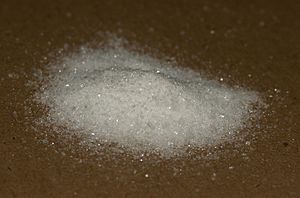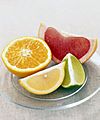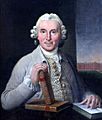Ascorbic acid facts for kids

Ascorbic acid is a special type of sugar acid that's super important for your body! It's better known as vitamin C. It usually looks like white or light-yellow crystals or powder and dissolves easily in water. The name "ascorbic" actually means "no scurvy," because it helps prevent a disease called scurvy. It was the first chemical compound found and identified as vitamin C.
Contents
What is Vitamin C?
Vitamin C, or ascorbic acid, is a powerful nutrient your body needs to stay healthy. It's called an "essential" vitamin because your body can't make it on its own. You have to get it from the foods you eat or from supplements.
Why Your Body Needs Vitamin C
Vitamin C plays many important roles in your body. It's like a superhero for your health!
- Helps Your Immune System: It boosts your body's defenses, helping you fight off colds and other illnesses.
- Heals Wounds: It's needed to make collagen, a protein that helps your skin, bones, and blood vessels grow and repair themselves. This means it helps cuts and scrapes heal faster.
- Protects Your Cells: Vitamin C is an antioxidant. This means it protects your cells from damage caused by harmful molecules called free radicals.
- Absorbs Iron: It helps your body take in iron from plant-based foods, which is important for making healthy red blood cells.
Where to Find Vitamin C
You can find lots of vitamin C in many fruits and vegetables.
- Citrus Fruits: Oranges, grapefruits, lemons, and limes are famous for their high vitamin C content.
- Berries: Strawberries, blueberries, and raspberries are also great sources.
- Other Fruits: Kiwi, mango, and pineapple contain good amounts.
- Vegetables: Bell peppers (especially red and yellow), broccoli, spinach, and tomatoes are packed with vitamin C.
The Discovery of Vitamin C
For a long time, sailors on long voyages suffered from a terrible disease called scurvy. They didn't know what caused it, but it led to bleeding gums, tiredness, and even death.
James Lind and Scurvy
In 1747, a British Royal Navy surgeon named James Lind conducted one of the first recorded controlled experiments. He gave different groups of sailors various treatments to see what would cure scurvy. He found that sailors who ate citrus fruits like oranges and lemons got better. This showed that something in these fruits prevented scurvy.
Albert Szent-Györgyi's Work
Centuries later, scientists worked to find the exact substance that prevented scurvy. In the 1930s, a Hungarian scientist named Albert Szent-Györgyi made a huge breakthrough. He managed to isolate and identify the chemical compound responsible: ascorbic acid. He even found a way to mass-produce it, which helped with research. For his discoveries related to vitamin C, he was awarded the Nobel Prize in Medicine in 1937.
Linus Pauling and Vitamin C
In the 1970s, Nobel prizewinner Linus Pauling became famous for suggesting that taking large amounts of vitamin C could help prevent the common cold. He wrote a book about it called Vitamin C and the Common Cold. While the idea of mega-doses for colds is still debated, his work brought a lot of attention to vitamin C.
Images for kids
-
The Nobel prizewinner Linus Pauling advocated taking vitamin C for the common cold in a 1970 book.
-
Citrus fruits were among the first sources of vitamin C available to ships' surgeons.
-
James Lind, a British Royal Navy surgeon who, in 1747, identified that a quality in fruit prevented scurvy in one of the first recorded controlled experiments.
-
Albert Szent-Györgyi, pictured here in 1948, was awarded the 1937 Nobel Prize in Medicine "for his discoveries in connection with the biological combustion processes, with special reference to vitamin C and the catalysis of fumaric acid".
See also
 In Spanish: Ácido ascórbico para niños
In Spanish: Ácido ascórbico para niños
 | Charles R. Drew |
 | Benjamin Banneker |
 | Jane C. Wright |
 | Roger Arliner Young |







